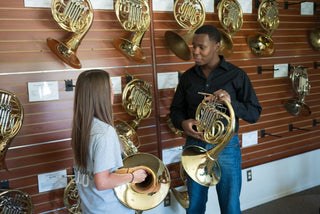Finding the right French horn for yourself can be a difficult task. However, with some guidance and a methodical approach, you will find an instrument that you will be happy with for many years.
The Basics of Horn Selection
- Don’t look to equipment to solve fundamental problems.
- Have a teacher, colleague, or experienced friend help you.
- Know your goals and who you will (or want to) play with.
- Know your budget and stick to it.
Getting Started
- Have your current equipment available to compare when you test horns.
- Warm up on your current equipment in the space in which you will be trying something new.
- Focus on sound.
- If you focus on sound first, and see it as the most important aspect of a horn, it will be easier to choose.
- Be opinionated and have a good sense of the sound you want to produce before you start trying instruments.
- Keep your right hand in the same position on each horn.
- Horn workshops are wonderful places to see a lot of horns, but you should go to a quiet room to listen to the instrument carefully before making a purchase.
- Make sure the horn has good intonation and plays in tune with itself.
- Choose an instrument that is fun to play.
- A horn that is fun to use will be practiced on more than one that is a struggle.
- Check to see how easy is it to move around the instrument, slur, articulate, play loudly, etc.
- Compare only two horns at a time to avoid confusion.
- Start choosing horns by playing in your sweet spot (i.e. Mozart Concerto, scales, etc.). When your choices are narrowed down, start playing in the extremes (Low, High, Loud, Fast).
- Remember the sound you produce while testing the extremes is the most important aspect to consider.
The Various Levels of Horns
Factory Made (<$7,500)
- These horns are made on an “assembly line” with many different workers of varying levels of skill working on the instrument. Many hundreds of these horns are produced yearly and they are readily available.
- Large variances in quality can be found among different manufacturers, and they are not necessarily tied to price.
- The horns from some manufacturers are consistent; others are not.
- There are plenty of good horns in this price range, but many will have some unseen build problems (i.e. stress in the horn, tubes not joined together properly, etc.) that negatively affect the sound.
- Good intonation should always be non-negotiable; however, every horn at every level has a couple of bad notes.
- These horns can usually be improved and customized by a skilled technician; however, doing so doesn’t necessarily add value to the instrument.
- The era of automatically saying no to Chinese-produced horns is over, and multiple factories are producing quality instruments and striving to get better.
Small Workshop ($7,500-$11,000)
- These horns are hand-made by multiple workers who are usually musicians dedicated to producing high-quality instruments. These makers produce dozens of horns a year and they are available with a short wait of 1-6 months.
- Small workshop-produced instruments are usually (but not always) consistent and of very high quality. They are generally better than most instruments at the factory level.
Individual Maker “Mad Genius” (>$11,000)
- These custom horns are hand-made by one craftsman. An individual maker can usually only produce 10-15 horns a year and they tend to require a long wait to obtain (3-6 years).
- These horns are not necessarily “better” than horns made in a workshop. You don’t need to have a horn at this level to win a job, play professionally, etc.
- These instruments are generally of very high quality, but you must still watch out for bad craftsmanship (messy solder joints, slides that are hard to move, bell flares not seated all the way down, etc.).
- Don’t assume that any pre-owned horn you see by “famous maker” is a good one. Remember, at some point they were new to their craft.
Don’t know how to begin your search? You might want to check out our “Help Me Choose a Horn” page.
Mouthpieces
- Use the same process you use when choosing a horn. Sound and comfort are the most important aspects.
- Finding the right rim diameter and contour is key. What works for one embouchure won’t necessarily work with another.
- Different mouthpiece cups work well with different horns.
- Almost everyone should use a “middle-of-the-road” model that works well for everything, rather than one that is great at one extreme, but terrible at another.
- Recommendations: Medium or Medium Deep Cup, 11-17 bore, medium or medium thick rim.
Maintaining the value of your instrument
- Oil your horn weekly to prevent corrosion. Make sure to oil the top and bottom bearings, any linkages, and down the slides.
- Have a professional ultrasonic cleaning done every 12-18 months to remove corrosion and mineral deposits. A cleaning at home in a bathtub cannot substitute for one done by a professional.
- Be careful not to drop or damage the horn, especially the bell flare.

